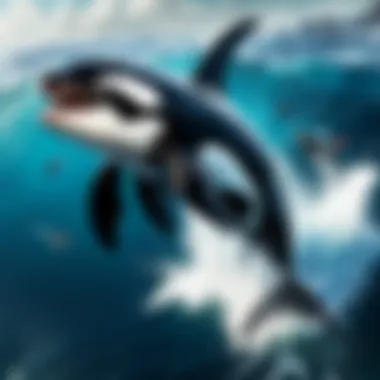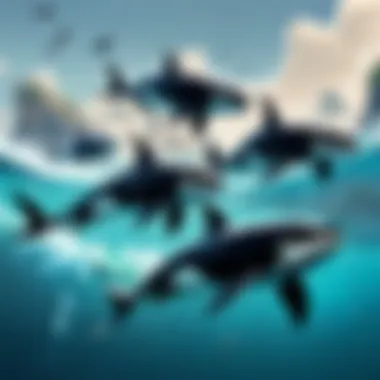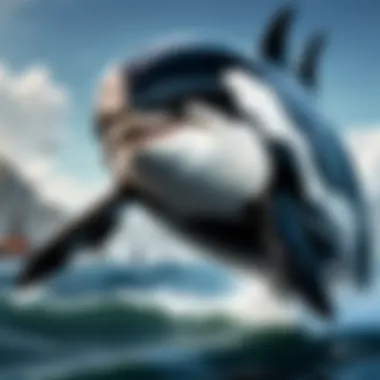Unraveling the Orca: The Mighty Apex Predator of the Sea


Game Updates and Patch Notes
As we delve into the realm of orcas, let's first explore their significance as apex predators of the sea. Their imposing presence and remarkable hunting prowess make them key influencers in the marine ecosystem. Known for their intricate social structures and cooperative hunting techniques, orcas are truly captivating creatures that command respect in the vast ocean.
Character Guides
When examining orcas as apex predators, it becomes clear that their character manifests through their interactions within pods and their strategic hunting methods. Understanding their abilities and playstyle sheds light on how they navigate the waters with precision and coordination. By mastering each aspect of their character, one can appreciate the depth of their intelligence and adaptability in the wild.
Weapon Analysis and Loadout Suggestions
While orcas do not wield weapons in the conventional sense, their bodies are finely tuned instruments that serve as lethal tools in hunting and survival. Analyzing their physical attributes and how they utilize them effectively offers insights into their evolutionary advantage as apex predators. The recommended 'loadout' for an orca includes sharp teeth, impressive speed, and immense strength, tailored for various hunting strategies and prey types.
Game Strategies and Tips
To navigate the challenges of the marine environment, orcas employ well-honed strategies for different hunting scenarios. Their cooperative hunting techniques, communication signals, and adaptability in changing conditions provide valuable lessons for players of the ecosystem game. By incorporating these tips into your gameplay, you can enhance your decision-making and overall effectiveness in interacting with this apex predator of the sea.
Introduction
In this in-depth exploration of the orca, commonly known as the killer whale, we unravel the mysteries surrounding this apex predator of the sea. With its powerful presence and top position in the marine food chain, the orca captivates not only scientists but also enthusiasts of the oceanic world. Understanding the role and significance of apex predators like orcas is crucial for maintaining the delicate balance of ecosystems worldwide. This article aims to shed light on the unique characteristics and behaviors that define these majestic creatures.
Defining Apex Predators


Apex predators, at the peak of the food chain, play a pivotal role in regulating the populations of species below them. These dominant predators are characterized by their position as top hunters with no natural predators of their own. The presence of apex predators such as orcas indicates a healthy ecosystem, as their influence cascades through various species and marine dynamics. Examining the traits and functions that define apex predators helps us appreciate the intricate web of life in the ocean and underscores the vital importance of conservation efforts to protect these keystone species.
Orcas: The Apex Predators of the Sea
Orcas, also known as killer whales, reign as the apex predators of the sea, their significance in marine ecosystems unparalleled. These majestic creatures exemplify power and intelligence, commanding respect throughout the oceans. Understanding their role is crucial in exploring the delicate balance of oceanic life.
Physical Characteristics
Orcas boast a striking appearance characterized by their sleek black and white bodies, towering dorsal fins, and distinct white eye patches. Their streamlined physique allows for agile movement in the water, enabling swift and precise hunting strategies. The sheer size and strength of orcas set them apart as formidable predators in the vast expanse of the sea.
Habitat and Range
Orcas inhabit diverse marine environments, from polar regions to temperate seas, showcasing their adaptability and wide-ranging presence. These highly intelligent creatures traverse the oceans in search of food, demonstrating a remarkable ability to thrive in various ecosystems. The migratory patterns of orcas reflect their deep connection to the marine world and the intricate web of life within it.
Social Structure
Within orca pods, intricate social structures govern interactions and behaviors, reinforcing bonds essential for survival. Matrilineal societies prevail among orcas, with elders playing crucial roles in passing down knowledge and skills to younger generations. The dynamics within a pod reveal a harmonious blend of cooperation and hierarchy, essential for navigating the challenges of the marine environment.
Communication and Vocalizations
Communication among orcas encompasses a rich tapestry of vocalizations, ranging from clicks and whistles to complex patterns of calls. These vocal exchanges serve multiple purposes, from hunting coordination to social bonding within the pod. The intricate language of orcas underscores their advanced cognitive abilities and deep-rooted social connections, shaping their interactions and collective endeavors.


Diet and Hunting Behavior
Orcas exhibit a diverse diet that includes fish, seals, and even other whales, showcasing their skilled hunting behavior and predatory prowess. The strategic collaboration within pods enables coordinated hunting strategies, ensuring successful prey capture. From tail slaps to encircling prey, orcas employ a range of tactics that highlight their adaptability and intelligence in securing sustenance amidst the challenges of the marine environment.
The Intelligence of Orcas
In the realm of marine life, the intelligence of orcas stands out as a remarkable subject of study. These apex predators showcase cognitive abilities that intrigue researchers and enthusiasts alike, making them a paramount topic within this article. Understanding the intelligence of orcas sheds light on their survival strategies and interactions within their ecosystem, providing invaluable insights into the complexity of their behavior.
Cognitive Abilities
The cognitive abilities of orcas encompass a wide range of mental functions that contribute to their adaptability and success as apex predators. From sophisticated communication skills to advanced problem-solving capabilities, orcas exhibit a level of intelligence that sets them apart in the marine world. Their ability to learn, remember, and make decisions based on past experiences showcases a cognitive prowess that continues to fascinate researchers studying their behavior.
Problem-Solving Skills
One of the standout features of orcas is their exceptional problem-solving skills, which play a crucial role in their hunting strategies and social interactions. Through observation and experimentation, orcas demonstrate the ability to devise innovative solutions to overcome challenges in their environment. Their capacity to collaborate and communicate effectively further enhances their problem-solving abilities, highlighting the intricate and strategic nature of their behavior.
Tool Usage
In the realm of tool usage, orcas exhibit a level of proficiency that underscores their intelligence and adaptability. From using objects in their environment to enhance hunting techniques to creating intentional disturbances to catch prey, orcas showcase a remarkable understanding of tool use. This skill not only reflects their ability to think critically and adapt to different situations but also emphasizes their resourcefulness in utilizing available resources to increase hunting success.
Orcas in Culture and Conservation


In delving into the intriguing realm of orcas, it is imperative to grasp their significance in both cultural beliefs and conservation efforts. Orcas hold a prominent role in various indigenous cultures and mythologies worldwide, symbolizing strength, intelligence, and unity with nature. Understanding the cultural importance of orcas provides a unique lens through which to appreciate these majestic creatures. Furthermore, focusing on conservation is crucial to safeguarding orcas' existence in the face of increasing human impact on marine environments. Conservation efforts aim to protect orcas from threats such as habitat loss, pollution, and overfishing, highlighting the pressing need for sustainable practices in marine resource management.
Cultural Significance
The cultural significance of orcas spans across diverse societies, illustrating the deep-rooted connection between humans and these apex predators. Indigenous communities often revere orcas as spiritual beings, viewing them as guardians of the ocean and embodying values of family bonds and wisdom. Artifacts, stories, and rituals related to orcas symbolize the harmony between humans and the natural world, echoing the importance of ecological balance and mutual respect. By exploring the cultural significance of orcas, we gain insights into the rich tapestry of human-animal relationships and the intrinsic value of coexisting with nature.
Threats and Conservation Efforts
Despite their iconic status, orcas face a myriad of threats that jeopardize their survival in marine ecosystems. Pollution, climate change, disturbance from human activities, and depletion of prey populations pose significant risks to orcas' well-being. Conservation efforts play a vital role in mitigating these threats through initiatives such as habitat protection, research monitoring, and advocacy for sustainable fishing practices. By raising awareness about the challenges confronting orcas, conservationists strive to mobilize support for long-term conservation strategies that ensure the persistence of orca populations for future generations.
Captivity Controversy
The issue of orcas being held in captivity has sparked debates regarding animal welfare, ethical concerns, and the purpose of marine parks and aquariums. While captivity can provide opportunities for research and education, critics argue that confining orcas can lead to physical and psychological stress, depriving them of their natural behaviors and social interactions. The captivity controversy underscores the complex relationship between humans and orcas, prompting discussions on ethical considerations in animal captivity and the broader implications for conservation efforts. Recognizing and addressing the controversies surrounding orcas in captivity is essential for fostering ethical stewardship of marine species and promoting effective conservation practices.
Conclusion
In concluding the exploration of Orcas as apex predators of the sea, it becomes evident that these magnificent creatures play a crucial role in maintaining the delicate balance of the marine ecosystem. Understanding the behavior and characteristics of Orcas not only expands our knowledge of the ocean's hierarchy but also sheds light on the interconnectedness of marine life. By delving into their physical characteristics, habitat, social structure, communication methods, diet, and hunting habits, we gain a profound appreciation for the complexity of nature.
Examining Orcas as apex predators serves as a reminder of the awe-inspiring power of the natural world and the need for conservation efforts to protect these majestic creatures for future generations to admire and study. The profound impact Orcas have on marine ecosystems underscores the importance of sustainable practices and environmental awareness. Through studying Orcas, we unveil the mysteries of the ocean and the intricate web of life that depends on these apex predators for balance and stability.
The Majesty of Orcas
Diving into the realm of Orcas reveals a world of unparalleled grandeur and magnificence. The majesty of Orcas stems not only from their physical prowess as apex predators but also from their sophisticated social structures, intricate communication methods, and unparalleled hunting techniques. Witnessing Orcas in their natural habitat is a testament to the splendor of the marine world and the remarkable diversity of life within it.
Orcas' majestic presence in the waters captivates all who have the privilege of observing them, evoking a sense of wonder and deep reverence for these intelligent beings. Their sleek black and white bodies cutting through the waves embody grace and power, symbolizing the unyielding force of nature at its finest. The cultural significance of Orcas further elevates their majesty, as they have been revered by various societies throughout history as symbols of strength, wisdom, and harmony with the sea.
To comprehend the majesty of Orcas is to grasp the intricate tapestry of life in the oceans and the integral role these apex predators play in shaping marine ecosystems. Their significance extends beyond mere dominance in the food chain; Orcas embody a profound connection to the ocean, serving as ambassadors of the sea's mystique and beauty. By acknowledging the majesty of Orcas, we embark on a journey of discovery and admiration for one of nature's most extraordinary creations.



